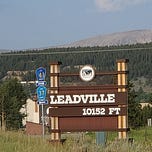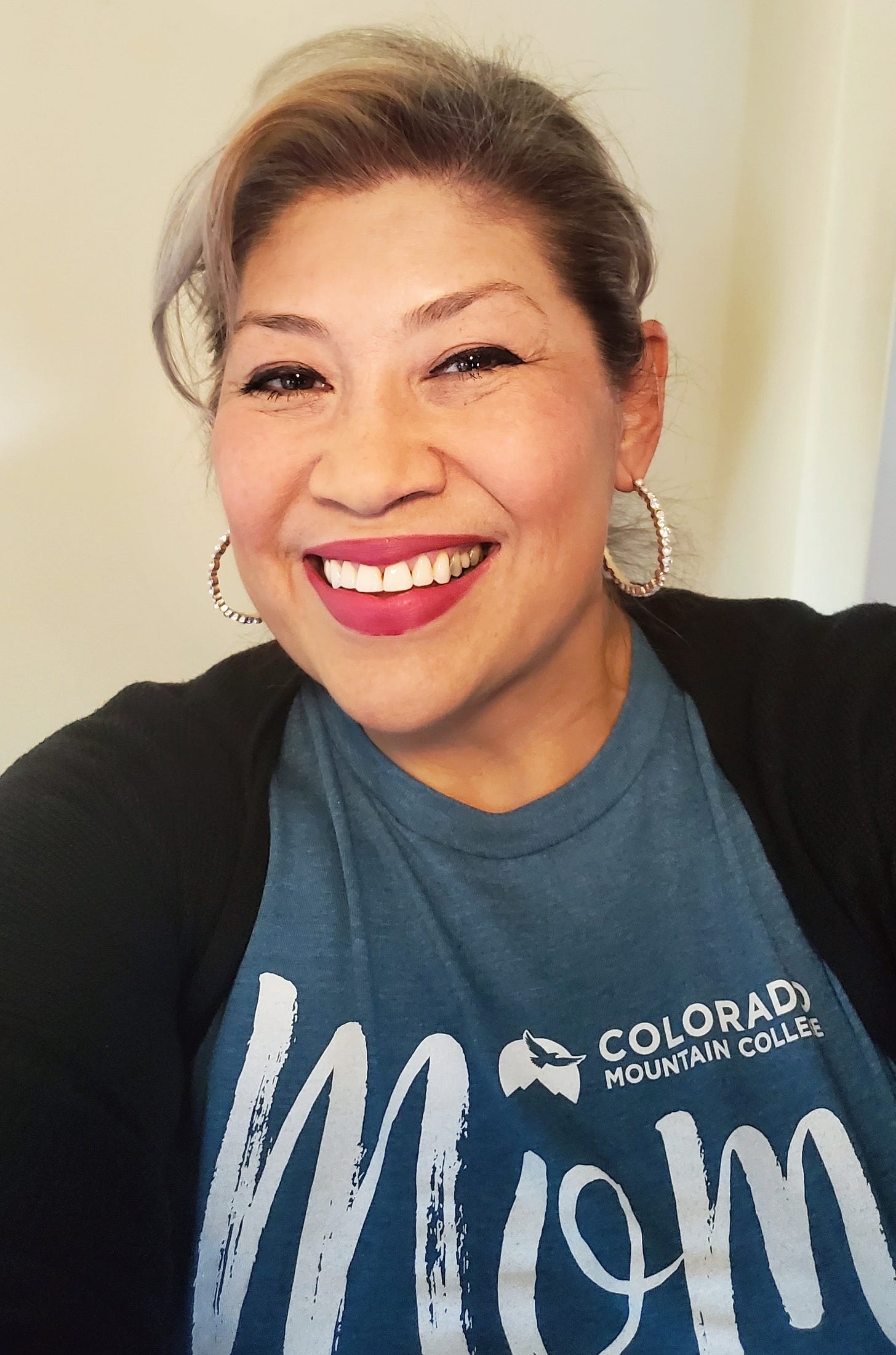Note: This post is a write-up of initial observations as both a “CMC Mom” and an Indigenous anthropologist of all things settler during a few days in Leadville, Colorado.
I like this little town, to my surprise. I am here because my daughter just enrolled in Colorado Mountain College (CMC). I liked it even more when I checked out of the historic Old West hotel after my first night here. That hotel was recently bought by new owners and, by the sounds of it, is in the process of being bougied up. Disclaimer: the quirky local guy working the front desk was super helpful in terms of local recommendations and even went outside and checked that my car was not illegally parked. I couldn’t face going down to check the parking signs again after having climbed three flights of steep, too-narrow stairs with those old-timey bannisters that only come up to mid thigh, which seems weird for all those miners and tycoons who were probably stumbling around here drunk in the 1880s. Maybe they were all really short? I am recovering from a knee injury from believing I could do a trampoline workout, and those stairs were killers. Also, every other guest seemed to like slamming doors and talking loudly in the hallways of the reportedly haunted hotel that has no soundproofing (p.s. I am working on another Unsettle post about haunted places where I have lived.) I am happy to report that I did not make the acquaintance of any Old West white spirits there. Although maybe it was spirits slamming doors starting at 5:45 am that morning?
On my second day in Leadville, I moved to a roadside hotel at the end of town where the bricks and mortar historic buildings and old wooden houses with porches and turrets—some dilapidated, some gentrified—have turned to trailer houses, reminiscent of places I lived as a child in Aberdeen, South Dakota or in Sioux City, Iowa for a brief stint. I saw a dark-haired young woman outside on her trailer patio with kids’ bikes on it, on her phone, and smoking a cigarette with her hair up. She was wearing a wrinkled, but cute peasant top and skirt. She was barefoot or wearing flip-flops. Despite my long and circuitous road since the 1970s from those trailer houses, I feel more comfortable on this end of town. My current hotel has seen better days. It has potholes and cracks in the parking lot and looks a little run-down from the outside. But this room from which I write is very clean, the bed comfortable, and I’ve had three quiet night’s sleep here. It even has mint green and pink bathroom linoleum like one of my aunts would’ve had in the 1980s. I especially like the friendly, not bougie people working the front desk who are also local residents, I assume, and who directed me to the nice little laundromat in town with good machines and interesting characters: dusty looking backpacker types and equally dusty, quiet mountain guys with rez-looking dogs.
I have spent the last few high-altitude, out-of-breath days shopping and unloading my little hatchback of several loads of my daughter’s personal items, dorm room extras, food, and extra cleaning supplies to last the whole year (hint, hint, Babygirl—my nickname for her). She’s attending Colorado Mountain College because they have outdoor recreation leadership programs, other trades and certifications, and a two-year environmental studies academic track meant to transfer to four-year universities. When her dad and I sent our mountain girl to a three-week Outward Bound trip in the Sierra Nevadas a couple years ago, she screamed with anticipation as she read the online trip descriptions and again when she was packing her camping gear before her flight west. I ordered this t-shirt because I am surprisingly that Mom, and I am so excited for how excited she is to be here.
One lesson I’ve learned is, be careful where you raise your kids. Formative lands, waters, and experiences matter. I am a prairie flatlander. But my daughter’s father and I raised her in or near mountains in Arizona, California, and Virginia. She won’t tolerate the prairies for long. My daughter and I both agree that Leadville reminds us of Ukiah, California, the Mendocino County seat where we lived on-and-off when she was between five and ten years old. Her dad worked for the Pinoleville Pomo Nation, which is headquartered in Ukiah. Leadville is simultaneously a little more downscale (that seems to be changing) and a little more touristy, and it has mining history more front and centre, not only on the internet, but in its main street businesses. Leadville also does not have Ukiah’s wine country vibe, with the exception of a similar wealth disparity between tourists and local workers. But the combination of mountain country people, the particular type of racial diversity in Leadville (minus small Native communities), and more hipstery outdoorsy types recall Mendocino County.
When we were in California, I was on faculty at the University of California, Berkeley. So we also lived in Berkeley for a few years during which I grew increasingly agitated. I knew that part of my problem was landscape, but another significant contribution to my displeasure was the culture of the Bay Area with its pervasive (by my prairie standards) Indigenous erasure. Despite its mountainous topography, I felt calmer and less disoriented when we lived in Mendocino County. I knew back then that Ukiah was more comfortable for me in part because there was a visible Indigenous presence. While they were not my particular People, and were in many ways culturally different, there was still a common social language related to our colonial resistances and survivals. Small reservations dot Mendocino and nearby Lake County and all of northern California.
I have learned over many years of living in and traveling to many places both in North America and globally that I crave prairie skies. I cannot go years without them. But I also need as much or more to be where Native people are not only present as distinct nations/Peoples, but where we are also visibly present as individuals or as extended families with everyday lives. I cannot abide anymore living in places where Indigenous people(s) are predominantly vanished, mythological ghosts in the minds of the local population. It’s not that I need to engage in “traditional Native” activities all of the time, but rather I need to see us as alive and present. That is my formative experience growing up between the urban Indian communities of Minneapolis and St. Paul and Dakota reservations in eastern South Dakota. Sure, I grew up going to ceremonies or to pow-wows (wacipi as we call them now with Dakota language reclamation), but more often, we Natives ran into each other in the Pizza Ranch, at the post office, at the tribe’s mini-mart, or in a high school classroom.
To return to Leadville, I have yet to learn how Indigenous people are seen and viewed in and around this little mountain town, which is coincidentally in another Lake County. Where as Ukiah is in Pomo territory with Native communities within and surrounding the town, Leadville is in Ute traditional territory. But the Ute tribes are today all four to five hour drives away from Leadville. I haven’t done real research on Native history in this area, but I am sure I’ll learn more while our daughter is here in school. Late last week, I got obsessed for a few hours with Wikipedia sites on Leadville history and the biographies of some of its colourful (white) historic characters. The internet dive helped me figure out who is in some of the old photographs I’ve seen on saloon and restaurant walls in Leadville. The little bits of history were interesting, and unsurprisingly erased Indigenous presence from this landscape.
Why then am I liking this little town in a way that feels like my affinity for Ukiah? Despite its high mountain terrain and the lack of visible Indigenous presence, I already hinted at a reason that has taken me longer to understand. I have an acute distaste for the particular kind of settler society pretentiousness with which I have had much contact, being highly formally educated. That is, the implicitly anti-Indigenous and anti-class-analysis form of “multiculturalist” politics that conditions “liberal” settler cities and their prestige institutions. Leadville, like Ukiah, is not that. Admittedly, I am just fine with Dakota community prestige politics. We can be culturally pretentious. But our cultural elitism isn’t really comparable to the liberal settler-colonial politics I’ve experienced at the prestige institutions I’ve attended, taught, and been invited to speak at. I’ll touch on Dakota ethnocentrism, I am sure, in future posts.
To return to Berkeley and the Bay Area and to other prestige institutions in so-called liberal cities, I don’t, of course, mean to uniformly critique everyone affiliated with such places. I have had colleagues and students at UC Berkeley and in other such places who are not insufferable elitists. But overall, and to use Berkeley as one example, I got weary of all the implicit or explicit Bay Area and UC Berkeley worship—as if it’s some uniquely enlightened geography and “excellent” institution. Really? By whose standards? Enlightened for whom and at whose expense? Indigenous genocide is daily erased there and yet it is a foundational energy upon which that campus and those cities are built, as with all of these colonial cities.
In all of my geographic relocations, I have figured out something that is ultimately simple: I prefer to live where those who want to forget or justify genocide and land theft must be explicit in their Indigenous dismissal because we are still a visible threat. It doubly angers me to endure dismissal from those in places where Indigenous peoples are more curiosity than presence and where people are smugly self-satisfied that they are not party to the elimination. Whether in Cambridge, Massachusetts, where I’ve studied, or in Berkeley, too many people comfort themselves that they are actually enlightened and excellent, and certainly less a part of the Indigenous elimination problem than are all of the non-enlightened troglodytes in the backward and less prestigious places. The relatively few Natives at UC Berkeley while I was there were ignorable both in everyday and in official opportunities for acknowledgement and remembrance. A couple of years before I left, an administrator in charge of Diversity, Equity, and Inclusion issued an 80-page report on the state of diversity among faculty, students, and staff at Berkeley, but after the first mention of the U.S. census racial categories, Native peoples were never mentioned again. I can laugh diabolically now. Back then I was just enraged.
To return to Leadville and my concerns with Indigenous erasure, I briefly Googled for a Colorado Mountain College Indigenous land or territorial acknowledgement. I didn’t find one. I hope they are working on it. Land acknowledgements are most provocative and educational where they are most surprising, where they have not yet become de rigueur. CMC knows whose land they sit on as indicated by the fact that tribal members from one of the Ute tribes pay CMC’s lowest in-district tuition rate. I’ll make it an on-going small project to dig into local Indigenous history and relations over the next couple of years while our daughter is in school there. I’m headed back to Dakota homelands for a couple of weeks, but I’ll be back in Leadville after that for a quick visit on my way back to Canada. I am sure I’ll do additional future CMC Indigenous Anthro Mom Observations as I continue to analyze the various geographies of Indigenous elimination in this land currently occupied by the USA.
Thanks for reading or listening.
















Share this post